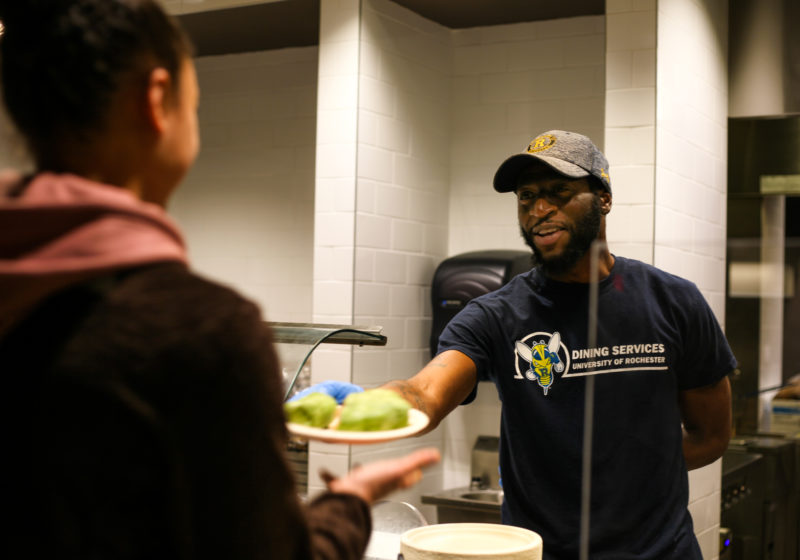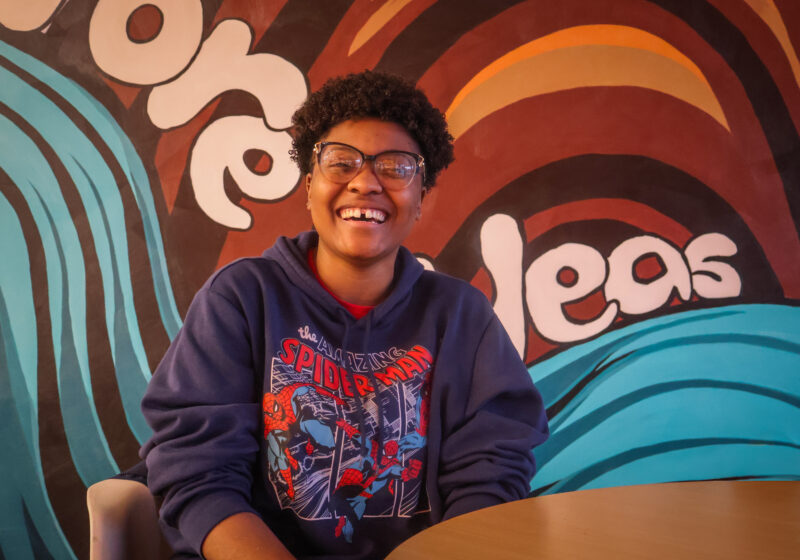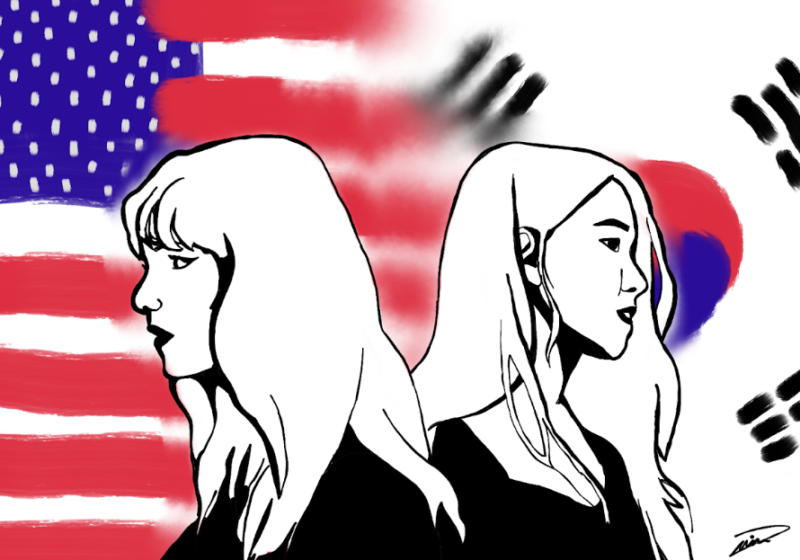Though Dining Services is one of the largest employers on campus, it is a relatively close knit community.
During transition periods or slow points throughout the day, employees gather around the register and kitchen stations to catch up. Their vivacious laughter can be heard from all corners of the empty Douglass Dining Hall.
Dawn serves as the matriarch: she knows exactly what is being prepared at each station, who should be manning it, and what needs to be done behind the scenes to make sure everything runs smoothly. This can be attributed to her role as Executive Vice President and Organizer of New York State’s division of Service Employees International Union (SEIU).
For Dawn, it is important the UR Dining employees are working in a safe environment.
“This is a dangerous job,” she says. “You have hot oils, you could start a fire; if you don’t have the right equipment, you could injure yourself.”
Keeping an eye and ear open for disagreements is also something she takes seriously. Tensions can rise, especially under the stress of dining hall rush hours. If such situations occur, proper grievance procedures must be implemented.
“Have you ever watched ‘Chopped’?” she asks. “Well, it gets like that back here sometimes.”
Leslie chimes in, “Yep, this is where all the drama happens.”
Other than working the register, cashiers are often required to help set up the stations before doors open.
This can be an frenzied task, especially in Douglass, where many of the stations are dedicated to certain diets. If an item that could contaminate the allergen-free station is accidentally brought there, for example, everything must be thrown out and the equipment properly sterilized.
With limited time before students start flooding in, this can be a major setback.
Tension and drama aside, they are still a family. Leslie and Shamika have become particularly close over the years.
“Miss Leslie is my mother away from home,” Shamika says.
In a separate interview, without knowing she had been called her mother, Leslie describes Shamika as her baby.
I mention to her what Shamika said.
“Really?” Leslie smiles coyly. “Me and that girl are just so intertwined.”
The student body makes up the largest portion of this extended family: nearly three and a half thousand pampered children whose nourishment is taken care of by Dining Services.
All three cashiers are not convinced that students recognize how much Dining Services and its employees do for them. Dawn blames this on a lingering teenage arrogance that some students have yet to grow out of.
Dawn and Shamika might let some of that overt egotism slide, but Leslie is not afraid to serve up a side of sass when necessary.
For example, the new doors put in during the renovation are designed to lock in place if pushed open all the way, something most students fail to recognize as they file in and out. The open doors create a perfect wind tunnel that blasts Leslie with frigid air.
At first, she recognized that the students were oblivious to what was happening and would either politely ask them to “please close the door” or get up herself to shut it. But after days of repeatedly asking students to be mindful of the door and taking hundreds of unnecessary steps to close it, Leslie began to get irritated.
Each time she feels the slightest breath of cold air seep through her sweatshirt, Leslie stiffens.
“Hey! Close the door!” she yells. Her voice booms through the dining hall, but the wind keeps it from reaching the students who are already walking away. Leslie doesn’t give up.
“Close the door! Close the door!”
Dawn casually points out the obvious: “I don’t think they can hear you.”
Leslie mumbles something under her breath about how they really need to fix the damn things, and grudgingly gets up to close it.
On the rare occasion that students do hear Leslie, they freeze before slowly turning around to confront the intimidating voice. She gives them a wide-eyed stare that says, Well, pay more attention next time. They close the door, white-knuckled and whispering short apologies without making eye contact.
While swiping into the dining hall, student engagement with employees rarely graduates from the ritualistic “hello, how are you?”
There are some exceptions, however.
Watching Leslie, Dawn, and Shamika work, it’s easy to tell who has made an effort to get to know them.
“Oh hey, Daniel.” Dawn squeals as one such student walks in. “Where’s your instrument?”
She glares at him, jokingly.
“You better be practicing.”
Daniel chuckles.
“Don’t worry, Dawn. I’ve been practicing lots.”
“Glad to hear it,” she says with a wide smile. “Enjoy your lunch now, dear.”
Out of the three, Dawn seems to know the most students. This might have to do with her level of experience—or maybe it’s because she’s mentioned on the University’s list of “101 Things to do Before You Graduate,” handed out to freshman at the start of the year.
The task “Make friends with Dawn, the world’s nicest Dining Services worker” can be found about halfway down.
Leslie, on the other hand, has formed an incredibly strong relationship with juniors Nicolette and Julianna Kober. The twin sisters met Leslie their freshman year, when they frequented the dining hall after soccer practice.
“It was usually early in the morning,” Julianna says, “and Leslie was always just so energetic.”
The three would spend time catching up and eventually Leslie began to refer to the girls excitedly as her “babies” when they walked in.
Over the years, the relationship has grown, and Leslie has become “a loving mother away from home” for the Kobers. Whenever they have a stressful day, Leslie is there, willing to talk things through and offer up advice.
“Sometimes I’ll come in during a transition period, when the hall is closed, and just sit and chat with her,” says Julianna.
“I think it gives our parents peace of mind, knowing that we have an amazing support system at school,” says Nicolette.
Their mom is even friends with Leslie on Facebook.
“I don’t even have these kinds of relationships with my professors,” Nicolette says.
The twins have actually established close relationships with a handful of the service employees on campus. Especially Julianna, who works at Connections.
Last year, Julianna remembers when her sister took a last minute trip to Peru with some friends.
“I was so nervous,” she recalls. “I was at work and Miss Karen [her supervisor] noticed something was wrong. I told her how worried I was for my sister and she said, ‘Come with me, we’ll go pray.’ We went to the bathroom and prayed for probably 20 minutes or so. I really value Miss Karen’s spirituality. I’m not even a religious person, but it just made me feel so much better.”
“Maybe that’s what kept the bulls from attacking me,” says Nicolette.
There’s a spectrum of student-employee relationships: on the “exemplary” side are the Kobers, but there are a handful that could be classified as “unsatisfactory.”
In fact, some students have acted downright insulting—slamming ID cards on the table, wrapping their hands with their sleeves when receiving it back, and being vocally abusive when something doesn’t go their way.
One time Shamika had to tell a student about the rules regarding “clamshells,” the green plastic to-go containers students can purchase from Dining Services for $5.
“There’s a lot of misinformation that circulates about how the clamshells can be used,” she says. “I don’t think the management explains the program well enough to students.”
The containers are intended for students who might not have time to sit down at the dining hall and eat their meal. Instead, they can fill a Clamshell and bring it with them to class or the library.
Many students, though, believe they can sit down to eat a meal and fill up a Clamshell for later.
That is not the case.
“In that situation you would have to pay for the equivalent of two meals,” explains Shamika, “otherwise we as a department would lose money.”
The student ended up paying for both meals, but not without a feisty confrontation.
When Shamika tried to hand his change (about $12) back, he looked her in the eyes and said, angrily, “No, you keep it. You need it more than I do,” and stormed out of the hall.
Hearing stories like this one infuriates the Kobers.
“They are people too,” says Julianna. “They deserve to be respected. I mean, how would you even get into the dining hall if people like Miss Leslie, Shamika, or Dawn weren’t there?”
Dawn, Leslie, and Shamika would love to see all students treat them with kindness and consideration.
“We provide them with delicious meals that take into consideration their diets and allergies,” says Dawn, something she believes warrants some form of acknowledgement.
Nicolette says it could something be as simple as making eye contact.
“I think you make such a personal connection just by doing that.”
For Julianna, engaging with service workers is an opportunity to form new friendships. Students who choose not to are “missing out, and that’s their loss.”
Despite occasional unsettling incidents, Shamika says most of her interactions with students are pleasant.
“There are a lot of sweet kids at this school,” she says. “You just, you know, get a bad apple every once in awhile.”




